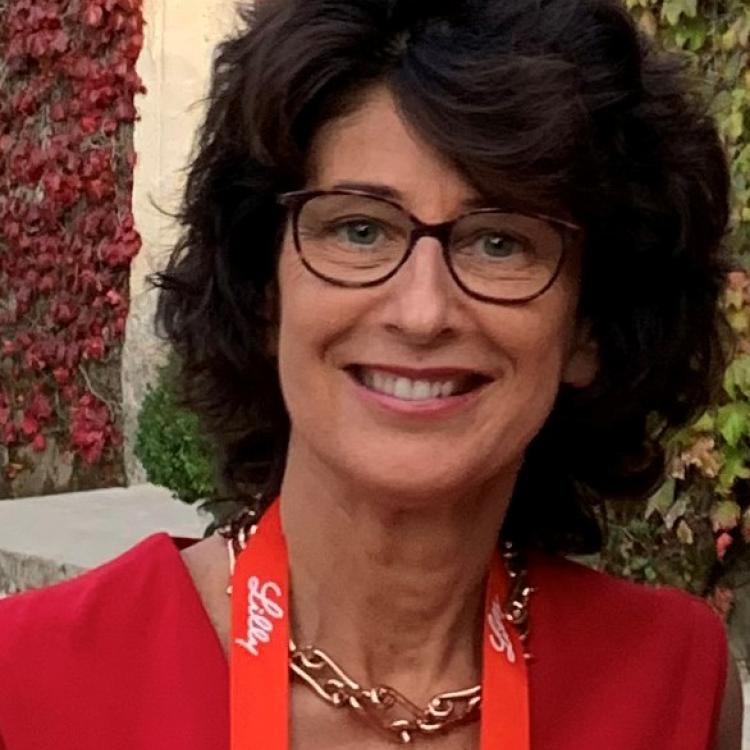
Caterina Missero
Caterina Missero, Professor of Molecular Biology
She is currently full Professor of Molecular Biology at the Department of Biology, University of Naples Federico II. She trained at Yale University as a post-doc and subsequently at the Massachusetts General Hospital-Harvard Medical School as Research Scientist. In 2000, she joined the Telethon Institute of Genetics and Medicine (TIGEM – Naples) as a Principal Investigator and devoted her studies to the transcriptional regulation in skin diseases. In 2006 she moved to CEINGE, where she is currently Principal Investigator. She has been board member of Italian Society of Molecular Biology (SIBBM) and of the European Society of Dermatological Research (ESDR). In addition, she is head of the facility of Advanced Light Microscopy at CEINGE (https://www.ceinge.unina.it/en/advanced-light-microscopy-alm-facility).
Prof. Missero is an expert in the molecular mechanisms required for gene expression in skin in health and disease, as testified by more than 60 original articles published in top international journals including Developmental Cell, PNAS, Nature Communication, J. Clinical Investigation, Genes & Development., EMBO Molecular Medicine, American J Human Genetics, J. Cell Biology, Genome Research. Her research is funded by AIRC (Italian Association for Cancer Research) and Telethon Foundation for rare diseases.
Dr. Missero’s research is focused on the transcriptional mechanisms and genetic pathways required for normal skin development and function that are altered in inherited and acquired skin diseases. More specifically, her team has dissected the molecular pathways controlled by the transcription factor p63, a master regulator of embryonic development and adult homeostasis of stratified epithelia. Recently her team is beginning to apply the basic knowledge acquired on p63 function in disease to identify therapies for the pathological conditions indicated below.
1. Developing therapeutic strategies to rescue epidermal defects in in ectodermal dysplasia-related syndromes.
Mutations falling in distinct p63 protein domains can cause at least five different Ectodermal Dysplasia-related syndromes, of which Ankyloblepharon-ectodermal defects- cleft lip /palate (AEC) syndrome is characterized by long-lasting and life-threatening skin erosions. Using constitutive and conditional knock-in mouse model, her team has demonstrated that skin fragility in AEC syndrome is due primarily to defects in cell adhesion and mechanical resistance caused by downregulation of a large number of key regulators and structural epidermal genes. Importantly, her team has discovered that AEC syndrome is a protein aggregation disorder in which mutant p63 accumulates in the nucleus forming high molecular weight protein aggregates. Currently her work is focusing at identifying therapeutic approches for AEC syndrome using two independent strategies: a) establishing a gene editing approach to correct the mutant p63 gene; b) assessing the efficacy and long-term safety of promising chemical compounds able to inhibit mutant p63 aggregation that the lab has recently identified.
2. Identifications of crucial determinants sustaining cell expansion programs in cutaneous squamous cell carcinoma (cSCC) and interventional strategies.
Being the second most frequent type of human malignancy worldwide with rapidly increasing incidence, cSCC is a major health concern. To search for therapeutic strategies, the team is dissecting the molecular pathways downstream of p63 in human SCCs. p63 is overexpressed from early stages of cSCC formation, antagonizing cell cycle arrest and sustaining cSCC undifferentiated state in multiple ways. With the goal to bridge basic science and translational research, we are currently focusing on druggable components of the complex gene network centered around the dysregulated p63 transcriptional program to which cSCC are addicted. Toward this end, we have recently identified molecular and functional p63 interactors expressed at high levels in cSCC. We are investigating novel pharmacological strategies based on the use of specific inhibitors alone or in combination with other drugs for intractable advanced cSCC.
- Dario Antonini, Researcher (RTD-B)
- Stefano Sol, Postdoc
- Gloria Urciuoli, PhD student
- Ludovica D’Auria, PhD student
- Marco Franciosi, Master student
- Fabiana Boncimino, Master student
- Osterburg C, Osterburg S, Zhou H, Missero C, Dötsch V. Isoform-Specific Roles of Mutant p63 in Human Diseases. Cancers (Basel). 2021 Jan 31;13(3):536. doi: 10.3390/cancers13030536.
- Dotto GP, Missero C. Flash forward genetics: new twists in transcription across evolutionary boundaries. EMBO Rep. 2021 Feb 8:e52152. doi: 10.15252/embr.202052152.
- Miro C, Di Cicco E, Ambrosio R, Mancino G, Di Girolamo D, Cicatiello AG, Sagliocchi S, Nappi A, De Stefano MA, Luongo C, Antonini D, Visconte F, Varricchio S, Ilardi G, Del Vecchio L, Staibano S, Boelen A, Blanpain C, Missero C, Salvatore D, Dentice M. Thyroid hormone induces progression and invasiveness of squamous cell carcinomas by promoting a ZEB-1/E-cadherin switch. Nat Commun. 2019 Nov 27;10(1):5410. doi: 10.1038/s41467-019-13140-2.
- Choo MK, Kraft S, Missero C, Park JM. The protein kinase p38α destabilizes p63 to limit epidermal stem cell frequency and tumorigenic potential. Sci Signal. 2018 Oct 9;11(551):eaau0727. doi: 10.1126/scisignal.aau0727.
- Russo C, Osterburg C, Sirico A, Antonini D, Ambrosio R, Würz JM, Rinnenthal J, Ferniani M, Kehrloesser S, Schäfer B, Güntert P, Sinha S, Dötsch V, Missero C. Protein aggregation of the p63 transcription factor underlies severe skin fragility in AEC syndrome. Proc Natl Acad Sci U S A. 2018 Jan 30;115(5):E906-E915. doi: 10.1073/pnas.1713773115.
